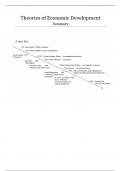Summary
Samenvatting - Theorists of Economic Development (DEC22803)
- Course
- Institution
Dit is een samenvatting van het vak Theorists of Economic Development (DEC22803). De samenvatting sluiten aan op de lecture slides. De taal is gedeeltelijk Engels, gedeeltelijk Nederlands. Moeilijke begrippen zijn in het Nederlands uitgelegd. Het tentamen is in het Engels.
[Show more]



